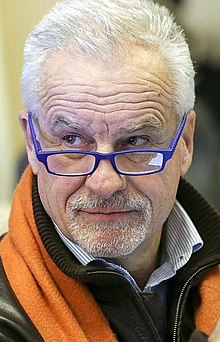|
Sergey Yastrzhembsky
Sergey Vladimirovich Yastrzhembsky (Russian: Серге́й Владимирович Ястржембский, Polish: Siergiej Władimirowicz Jastrzębski; born December 4, 1953) is a Russian statesman and diplomat. He has the federal state civilian service rank of 1st class Active State Councillor of the Russian Federation.[1] He was Boris Yeltsin's Spokesperson. BiographyDescends from the szlachta of the Grand Duchy of Lithuania. Educated at Moscow State Institute of Foreign Relations (MGIMO), allegedly a recruiting ground for the KGB',[2] under the Soviet Union's Foreign Ministry in 1976, and as a postgraduate at the Soviet Academy of Sciences' Institute of the International Workers' Movement in 1979, where he earned a Ph.D. in history.[3] In 1992-1996, he was in the diplomatic service, holding different positions including the post of the Russian ambassador to Slovakia. Yastrzhembsky was promoted to the diplomatic rank of the Ambassador Extraordinary and Plenipotentiary, the highest diplomatic rank in the Russian Federation, by the Decree of the President of Russia of 20 June 1994 No. 1287.[4] Since 13 August 1996, he worked as President Boris Yeltsin's chief spokesperson. Yastrzhembsky was promoted to the rank of the 1st class Active State Councillor of the Russian Federation, the highest federal state civilian service rank in the Russian Federation, by the Decree of the President of Russia of 10 March 1997 No. 204.[1] On 12 September 1998, he was dismissed from the post of the President's chief spokesperson. After leaving the Presidential Administration of Russia and vacation in Africa, where he met his future wife, Yastrzhembsky began to work in the Government of Moscow. The period of his service in this state body lasted two years, from 1998 to 2000. Since 20 January 2000, Yastrzhembsky worked as President Vladimir Putin's chief spokesperson on the conflict in Chechnya[5] for 14 months before receiving promotion in March 2001 to head the Kremlin's Information Policy Department, co-ordinating all Putin's external communications.[6] In 2004, Putin made him presidential special envoy to the EU in Brussels, where he earned a reputation for maladroit statements.[7] That position, Vedomosti reported on 8 May 2008, would become defunct when he left the post after Putin steps down. Towards the end of his posting to Brussels, Yastrzhembsky warned the EU that recognizing Kosovo's independence would open a "Pandora's box" of separatism in Europe.[8] In an interview with Vladimir Pozner, Yastrzhembsky told that Putin was extremely dissatisfied with his notice of resignation and became angry with him.[9] Currently he is involved in making a series of documentary films on traditional African people, entitled "Beyond the Passage of Time".[citation needed] Yastrzhembsky speaks English, French, Italian, Portuguese, Slovak.[citation needed] References
External linksWikimedia Commons has media related to Sergey Yastrzhembskiy.
|
||||||||||||||||||||||||||||||||||||||
